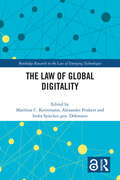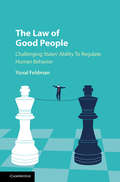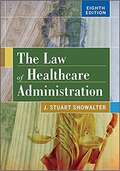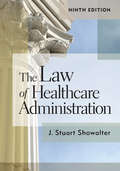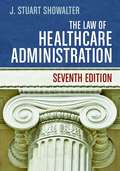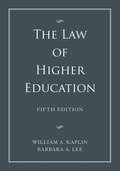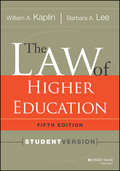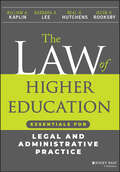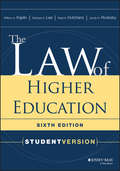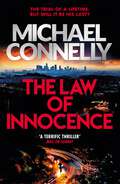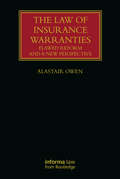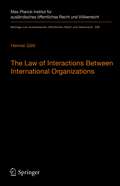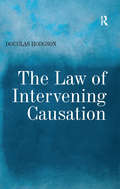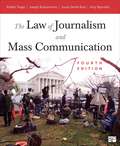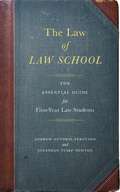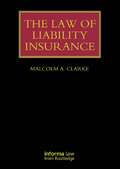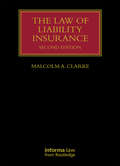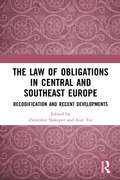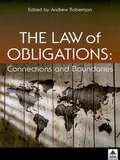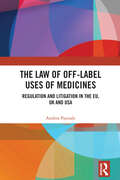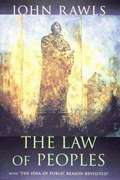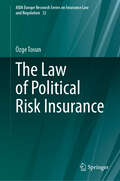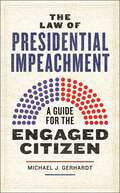- Table View
- List View
The Law of Global Digitality (Routledge Research in the Law of Emerging Technologies)
by Matthias C. Kettemann Alexander Peukert Indra Spiecker gen. DöhmannThe Internet is not an unchartered territory. On the Internet, norms matter. They interact, regulate, are contested and legitimated by multiple actors. But are they diverse and unstructured, or are they part of a recognizable order? And if the latter, what does this order look like? This collected volume explores these key questions while providing new perspectives on the role of law in times of digitality. The book compares six different areas of law that have been particularly exposed to global digitality, namely laws regulating consumer contracts, data protection, the media, financial markets, criminal activity, and intellectual property law. By comparing how these very different areas of law have evolved with regard to cross-border online situations, the work considers whether cyberlaw is little more than "the law of the horse", or whether the law of global digitality is indeed special and, if so, what its characteristics across various areas of law are. The book brings together legal academics with expertise in how law has both reacted to and shaped cross-border, global Internet communication and their contributions consider whether it is possible to identify a particular mediality of law in the digital age. Examining whether a global law of digitality has truly emerged, this book will appeal to academics, students and practitioners of law examining the future of the law of digitality as it intersects with traditional categories of law.
The Law of Good People: Challenging States' Ability To Regulate Human Behavior
by Yuval FeldmanCurrently, the dominant enforcement paradigm is based on the idea that states deal with 'bad people' - or those pursuing their own self-interests - with laws that exact a price for misbehavior through sanctions and punishment. At the same time, by contrast, behavioral ethics posits that 'good people' are guided by cognitive processes and biases that enable them to bend the laws within the confines of their conscience. In this illuminating book, Yuval Feldman analyzes these paradigms and provides a broad theoretical and empirical comparison of traditional and non-traditional enforcement mechanisms to advance our understanding of how states can better deal with misdeeds committed by normative citizens blinded by cognitive biases regarding their own ethicality. By bridging the gap between new findings of behavioral ethics and traditional methods used to modify behavior, Feldman proposes a 'law of good people' that should be read by scholars and policymakers around the world.
The Law of Healthcare Administration
by J. Stuart ShowalterThe Law of Healthcare Administration offers a thorough examination of health law in the United States from a management perspective. Using plain language accessible to nonlawyers, the book moves from broad-brush treatments of the US legal system and the history of medicine to specific issues that affect healthcare leaders daily, including contracts, torts, taxation, antitrust laws, regulatory compliance, and, most pressing, health insurance reform and the important changes that have taken place since the Affordable Care Act (ACA) became law in 2010. <p><p> The legal concepts discussed in the book are amply supported by real-life examples, detailed explanations, and excerpts from decisions of federal and state courts.
The Law of Healthcare Administration
by Stuart ShowalterA hacker accesses the medical records of more than 250,000 patients in a hospital-based clinic. Despite being counseled not to, staff in a psychiatric unit continually refer to a transgender boy using feminine pronouns, causing him acute depression and leading to his suicide. Citing moral objections and fearing prosecution, a physician refuses to prescribe lethal medication for a terminally ill cancer patient who wants to end her suffering. These kinds of situations don't just shock us with their drama; they also present serious legal challenges that healthcare leaders must be equipped to deal with. The Law of Healthcare Administration helps readers think through the issues, applying current legal principles and relevant judicial decisions. Author J. Stuart Showalter surveys the pressing issues that have resulted from two centuries of US policy, court decisions, and regulation. He writes from a management perspective, emphasizing a practical understanding of legal concepts, in a style that is clear and accessible to readers without a legal background. The ninth edition retains this authoritative book's many absorbing sidebars, surprising court records, and challenging discussion questions that have made it so engaging to past readers. The Law of Healthcare Administration prepares future leaders for the many legal challenges their institutions will likely face.
The Law of Healthcare Administration (Seventh Edition)
by J. Stuart ShowalterExamining healthcare law from the management perspective, the book offers a thorough treatment of healthcare law in the United States. The author addresses the significant changes the 2010 Affordable Care Act (ACA) makes to the healthcare industry, including provisions relating to taxation and compliance, the development of accountable care organizations, and new privacy rules under HIPAA.
The Law of Higher Education, 2 Volume Set
by Barbara A. Lee William A. KaplinMake sure you have a copy on your bookshelf.The Law of Higher Education, Fifth Edition, is the most up-to-date and comprehensive reference, research source, and practical legal guide for college and university administrators, campus attorneys, legal counsel, and institutional researchers, addressing all the major legal issues and regulatory developments in higher education.In the increasingly litigious environment of higher education, William A. Kaplin and Barbara A. Lee's clear, cogent, and contextualized legal guide proves more and more indispensable every year.Over 3,000 new cases related to higher education have been decided since the publication of the previous edition, and scores of changes to higher education law are made each year. Every section of the fifth edition contains new material, including those related to:Hate speech and free speech rights of faculty in public universitiesSharing of research with international colleaguesIntellectual property and peer-to-peer file sharingStudent suicideCampus safetyPolice and administrators' right to search students' residence hall roomsGovernmental support for religious institutions and religious autonomy rights of individual public institutionsCollective bargaining and antidiscrimination lawsNondiscrimination and affirmative action in employment, admissions, and financial aidFamily and Medical Leave Act and workers' compensationFERPA (Family Educational Rights and Privacy Act)
The Law of Higher Education, 5th Edition
by Barbara A. Lee William A. KaplinBased on the fifth edition of the indispensable guide to the laws that bear on the conduct of higher education, this student edition provides an up-to-date textbook, reference, and guide for coursework in higher education law and programs preparing higher education administrators for leadership roles. This student edition contains a glossary of key terms and an appendix on how to read legal material for the non-law student. Each chapter is introduced by a discussion of key terms and ideas the students will encounter.
The Law of Higher Education: Essentials for Legal and Administrative Practice
by Barbara A. Lee William A. Kaplin Jacob H. Rooksby Neal H. HutchensA comprehensive, up-to-date reference for higher education law faculty, administrators, counsel, and students This revised 7th Edition of The Law of Higher Education: Essentials for Legal and Administrative Practice offers updated information, analysis, and practical suggestions on a full range of legal issues pertinent to both public and private institutions. As a guide for coursework in programs preparing higher education lawyers and administrators for leadership roles, and as a reference for professionals in those fields, this book is essential for both students and practitioners. Covering the latest changes to laws in higher education, the 7th edition gives readers the most current possible understanding of higher education law. The book also contains a glossary of key terms and an appendix on how to read legal material for the non-law student. Each chapter is introduced by a discussion of key terms and ideas the reader will encounter. The book thoroughly addresses the most important contemporary issues in education law: free speech, Title IX, academic freedom, institutional tort liability, racial harassment, employment discrimination, disability and reasonable accommodation, campus security, and student organizations are among the key topics that readers will come to understand in depth. There have been substantial recent changes in the laws governing these issues, and practitioners will need the updated content in this book to remain conversant in todays' higher education law and policy. Gain a thorough understanding of the central topics in higher education law, including free speech, nondiscrimination, religious free exercise, and many others Review the latest changes to federal laws governing colleges and universities Reference a glossary of terms, statute index, and other convenient features Learn about the American court system and how to read and analyze court opinions The Law of Higher Education: Essentials for Legal and Administrative Practice is indispensable for anyone studying higher education administration, preparing for a career in higher education law, or seeking to learn more about law in higher education.
The Law of Higher Education: Student Version (The\jossey-bass Higher And Adult Education Ser.)
by Barbara A. Lee William A. Kaplin Jacob H. Rooksby Neal H. HutchensA single-volume text that distills information for students Based on the sixth edition of Kaplin and Lee’s indispensable guide to the law that bears on the conduct of higher education, The Law of Higher Education, Sixth Edition: Student Version provides an up-to-date reference and guide for coursework in higher education law and programs preparing law students and higher education administrators for leadership roles. This student edition discusses the most significant areas of the law for college and university attorneys and administrators. Each chapter is introduced by a discussion of key terms and topics the students will encounter, and the book includes materials from the full sixth edition that are most relevant to student interests and classroom instruction. It also contains a “crosswalk” that keys sections of the Student Edition to counterpart sections of the two-volume treatise. Complements the full version Includes a glossary of legal terms and an appendix on how to read legal material for students without legal training Discusses key terms in each chapter Concentrates on key topics students will need to know This is fundamental reading for law students preparing for careers in higher education law and for graduate students in higher education administration programs.
The Law of Human Remains
by Tanya MarshThe primary purpose of this book is to collect, organize, and state the legal rules and principles regarding the status, treatment, and disposition of human remains in the United States so that attorneys and courts can more easily discover, understand, use, and ultimately critique and reform the law.
The Law of Innocence: The Brand New Lincoln Lawyer Thriller (Mickey Haller Series #6)
by Michael ConnellyTHE TRIAL OF A LIFETIME.BUT WILL IT BE HIS LAST? 'Another masterpiece from one of the world's greatest crime writers' Express'This is Connelly on top form ... A terrific thriller' Mail on Sunday'Grabs you on the very first page and doesn't let go' The Times* * * * *Heading home after winning his latest case, defense attorney Mickey Haller - The Lincoln Lawyer - is pulled over by the police. They open the trunk of his car to find the body of a former client.Haller knows the law inside out. He will be charged with murder. He will have to build his case from behind bars. And the trial will be the trial of his life.Because Mickey Haller will defend himself in court.With watertight evidence stacked against him, Haller will need every trick in the book to prove he was framed.But a not-guilty verdict isn't enough. In order to truly walk free, Haller knows he must find the real killer - that is the law of innocence...* * * * *'Pick up this gripping book at your peril, especially if you have other things to do like working or sleeping.' Express'The so-called Lincoln Lawyer ... turns in another dazzling courtroom performance' New York Times Book Review* * * * *"The law of innocence is unwritten. It will not be found in a leather-bound code book. It will never be argued in a courtroom. In nature, for every action there is an equal and opposite reaction. In the law of innocence, for every man not guilty of a crime there is a man out there who is. And to prove true innocence the guilty man must be found and exposed to the world."* * * * *CRIME DOESN'T COME BETTER THAN CONNELLY.'One of the very best writers working today' Sunday Telegraph'The pre-eminent detective novelist of his generation' Ian Rankin'A superb natural storyteller' Lee Child'A master' Stephen King'Crime thriller writing of the highest order' Guardian'America's greatest living crime writer' Daily Express'A crime writing genius' Independent on Sunday
The Law of Insurance Warranties: Flawed Reform and a New Perspective (Lloyd's Insurance Law Library)
by Alastair OwenThe book provides a detailed review of efforts to reform the law on insurance warranties in Australia, New Zealand and the UK, arguing that none of these have been successful. The text proposes a radical new approach to reform of this area of the law, demonstrating through detailed stress testing of these proposals that they would deliver more consistent and equitable outcomes than those achieved to date. Reform of the historically inequitable law of insurance warranties in commercial insurance has been introduced in Australia, New Zealand and, most recently, the UK. This book demonstrates that all these reforms have flaws and that none of them can be relied upon to deliver consistently equitable and predictable outcomes; in particular the UK’s, as yet largely untested, Insurance Act 2015 is shown to have serious flaws that have not previously been identified. Building on lessons from these three jurisdictions, the book sets out an alternative approach for dealing with breaches of insurance warranties and demonstrates that this would consistently deliver better outcomes than any of the existing attempts at reforming this area of the law. Providing an unprecedented multi-jurisdictional review of the law on insurance warranties and in particular the treatment of warranties in the Insurance Act 2015, as well as outlining an innovative and radical alternative approach to reform, the book will be of considerable interest and value to practitioners, academics and students, as well as to other common law jurisdictions contemplating reform of this area of the law.
The Law of Interactions Between International Organizations: A Framework for Multi-Institutional Labour Governance (Beiträge zum ausländischen öffentlichen Recht und Völkerrecht #299)
by Henner GöttThe book analyses how international law addresses interactions between international organizations. In labour governance, these interactions are ubiquitous. They offer each organization an opportunity to promote its model of labour governance, yet simultaneously expose it to adverse influence from others. The book captures this ambivalence and examines the capacity of international law to mitigate it. Based on detailed case studies of mutual influence between the International Labour Organization, the World Bank, and the Council of Europe, the book offers an in-depth analysis of the pertinent law and its key challenges, both at institutional and inter-organizational level. The author envisions a law of inter-organizational interactions as a normative framework structuring interactions and enhancing the effectiveness and legitimacy of multi-institutional governance.
The Law of Intervening Causation
by Douglas HodgsonUtilizing a comparative examination of case-law from England, Canada, the USA, Australia, New Zealand and Ireland, this volume provides a comprehensive and systematic study of the law of intervening causation (novus actus interveniens) to present an analysis of this particular judicial limitation of liability device. The work provides a structure from which to formulate core general legal principles and identify the various legal tests utilized by the courts.
The Law of Journalism and Mass Communication (Fourth Edition)
by Amy L. Reynolds Joseph Russomanno Susan Dente Ross Robert TragerWith its clear and engaging writing, essential coverage and analysis, and substantive discussion of case law, this is a popular and comprehensive introduction to the law of journalism and mass communication. It includes: Photos and feature boxes, as well as a marginal glossary of legal terms and concepts Hypothetical cases which start each chapter and are then followed by a timeline showing landmark cases in context. Real World Law boxes illustrating contemporary examples and emerging topics Points of Law boxes underlining key points and legal tests. A student companion website to help aid review and study.
The Law of Law School: The Essential Guide for First-Year Law Students
by Andrew Guthrie Ferguson Jonathan Yusef NewtonOffers one hundred rules that every first year law student should live by“Dear Law Student: Here’s the truth. You belong here.” Law professor Andrew Ferguson and former student Jonathan Yusef Newton open with this statement of reassurance in The Law of Law School. As all former law students and current lawyers can attest, law school is disorienting, overwhelming, and difficult. Unlike other educational institutions, law school is not set up simply to teach a subject. Instead, the first year of law school is set up to teach a skill set and way of thinking, which you then apply to do the work of lawyering. What most first-year students don’t realize is that law school has a code, an unwritten rulebook of decisions and traditions that must be understood in order to succeed.The Law of Law School endeavors to distill this common wisdom into one hundred easily digestible rules. From self-care tips such as “Remove the Drama,” to studying tricks like “Prepare for Class like an Appellate Argument,” topics on exams, classroom expectations, outlining, case briefing, professors, and mental health are all broken down into the rules that form the hidden law of law school. If you don’t have a network of lawyers in your family and are unsure of what to expect, Ferguson and Newton offer a forthright guide to navigating the expectations, challenges, and secrets to first-year success. Jonathan Newton was himself such a non-traditional student and now shares his story as a pathway to a meaningful and positive law school experience. This book is perfect for the soon-to-be law school student or the current 1L and speaks to the growing number of first-generation law students in America.
The Law of Liability Insurance (Lloyd's Insurance Law Library)
by Malcolm A. ClarkeThis book provides an authoritative and comprehensive review of all aspects of the law that relate to liability insurance contracts. Taking an international comparative perspective, The Law of Liability Insurance covers all the major types of liability insurance, not just professional indemnity insurance, presenting the issues according to the general principles of contract law. The book begins by concentrating on the fundamentals of the liability insurance contract before moving on to cover conditions, defence, exclusions, and finally claims against and non-payment by the insurer. This book will be an invaluable reference tool for practitioners and professionals working in the commercial liability insurance industry, including those who operate globally, as well as being a source for academics and post-graduate students.
The Law of Liability Insurance (Lloyd's Insurance Law Library)
by Malcolm A. ClarkeNow it its second edition, this book is an authoritative and comprehensive review on all aspects of the law that relate to liability insurance contracts. It aims to cover the all the major types of liability insurance, not just professional indemnity insurance, and presents the issues according to the general principles of contract law. Updated to include the impact of the Insurance Act 2015, the book takes a comparative view of the law, tailored to those professionals operating in a global economy, as well as academics and post-graduate students.
The Law of Life and Death
by Elizabeth Price FoleyAre you alive? What makes you so sure? Most people believe this question has a clear answer—that some law defines our status as living (or not) for all purposes. But they are dead wrong. In this pioneering study, Elizabeth Price Foley examines the many, and surprisingly ambiguous, legal definitions of what counts as human life and death. Foley reveals that “not being dead” is not necessarily the same as being alive, in the eyes of the law. People, pre-viable fetuses, and post-viable fetuses have different sets of legal rights, which explains the law's seemingly inconsistent approach to stem cell research, in vitro fertilization, frozen embryos, in utero embryos, contraception, abortion, homicide, and wrongful death. In a detailed analysis that is sure to be controversial, Foley shows how the need for more organ transplants and the need to conserve health care resources are exerting steady pressure to expand the legal definition of death. As a result, death is being declared faster than ever before. The "right to die," Foley worries, may be morphing slowly into an obligation to die. Foley’s balanced, accessible chapters explore the most contentious legal issues of our time—including cryogenics, feticide, abortion, physician-assisted suicide, brain death, vegetative and minimally conscious states, informed consent, and advance directives—across constitutional, contract, tort, property, and criminal law. Ultimately, she suggests, the inconsistencies and ambiguities in U.S. laws governing life and death may be culturally, and perhaps even psychologically, necessary for an enormous and diverse country like ours.
The Law of Obligations in Central and Southeast Europe: Recodification and Recent Developments
by Zvonimir Slakoper; Ivan TotThe Law of Obligations in Central and Southeast Europe examines the new codifications, reforms, and other recent developments in Central and Southeast Europe which have significantly modernized the law of obligations in the last two decades, focusing particularly on the legal systems of Poland, Czech Republic, Slovak Republic, Hungary, Slovenia, Croatia, Serbia, and Turkey. With chapters authored by prominent academics and promising young legal scholars, this book discusses the results of the modernizations and describes the legislative reforms of the law of obligations that are underway or are discussed and advocated for in the countries of Central and Southeast Europe. Divergences of the new civil codes and other legislative acts from earlier legal solutions are identified and the rationale behind these departures is analysed, as well as the introduction of the new legal institutes in the law of obligations in these parts of the world. The Introduction provides a concise country-by-country overview of the recodification, modernization, and reform of the law of obligations in Central and Southeast Europe. In Part I, chapters discuss the process of recodification in the Slovak Republic, Czech Republic, Poland, and Hungary, with focus on the main novelties in their contract and tort law. The chapters in Part II then discuss several, more specific legal institutes of the law of obligations, and other recent developments and contemporary challenges to the law of obligations in the Czech Republic, Slovenia, Croatia, Serbia, and Turkey. This book is of interest to legal scholars in the field of private law, as well as to students, practitioners, members of law reform bodies, and civil servants in Central and Southeast Europe, and beyond.
The Law of Obligations: Connections and Boundaries
by Andrew RobertsonThis collection of essays makes an important contribution to debate about the structure underlying private law and the relationships between its different branches. The contributors, including leading private law scholars from Australia, England and Canada, provide valuable insights by looking beyond the traditional categories and accepted structure of the law of obligations. This book covers three topics. The first is concerned with classification and the law of remedies. The chapters on this topic deal with both the classification of remedies themselves and with remedial issues that cross classificatory boundaries within the law of obligations. The chapters on the second topic reconsider some of the boundaries drawn by judges and scholars within the law of obligations. The third topic deals with the relationship between obligations and property. The chapters in this book offer illuminating new perspectives on fundamental issues in the law of obligations. Together, they provide a thought-provoking reconsideration of connections and boundaries in private law.
The Law of Off-label Uses of Medicines: Regulation and Litigation in the EU, UK and USA
by Andrea ParzialeThis book examines the regulatory framework for untested and unapproved uses (off-label uses) of medicines in the EU, UK, and USA. Before reaching patients, medicines are extensively tested by manufacturers and approved by regulators to minimise the risk of adverse reactions. However, physicians can prescribe pharmaceuticals for off-label uses, widespread in paediatrics, oncology, rare diseases and, more recently, in treatment for Covid-19. While off-label uses may offer hope, they may also expose patients to risks and uncertainties. Clarification is therefore needed to improve the protection of patients' rights while enhancing legal certainty for health actors. To this end, this work clarifies the regulatory mechanisms and litigation trends concerning off-licence prescriptions in these jurisdictions. It assesses how traditional, prevention-driven regulatory and civil liability rules are being adapted to tackle potential risks and scientific uncertainty. The book outlines the applicable regulations, as well as considering Brexit’s impact on off-label policies in the UK, and EU and national off-label policies in the context of the fight against the Covid-19 pandemic. It also explores under what conditions physicians, manufacturers, or regulators must compensate patients injured by untested prescriptions. The book will be an essential resource for researchers, academics and policy-makers working in the areas of medical law and ethics, public health law, pharmaceutical law and private comparative law.
The Law of Peoples
by John RawlsThis work consists of two parts: the essay The Idea of Public Reason Revisited, first published in 1997, and The Law of Peoples, a major reworking of a much shorter article by the same name published in 1993. Taken together, they are the culmination of more than 50 years of reflection on liberalism and on some of the most pressing problems of our times by John Rawls.
The Law of Political Risk Insurance (AIDA Europe Research Series on Insurance Law and Regulation #12)
by Özge TosunThis book explores the scope of host states’ sovereign powers and the rights of foreign investors. Investors from developed countries engage in business with developing countries for various purposes, including political reasons, expanding and diversifying their operations, accessing essential natural resources and skilled labor forces, lowering their production costs, and in some cases, even mitigating global warming. Correspondingly, in order to attract foreign investment, host countries can provide incentives or make concessions. However, once the investment has been made, these ventures are vulnerable to the actions of the host state. Political risk insurance, as the name suggests, serves to protect investments made in foreign countries where the sovereigns are more likely to interfere in the business activities of foreign investors. This book offers a comprehensive understanding of the general mechanics of each main type of political risk, the entities responsible for these risks, insurers, their unions, and the subrogation process. Bridging the fields of investment law, insurance law, and international law, it offers valuable insights from both practical and academic perspectives.
The Law of Presidential Impeachment: A Guide for the Engaged Citizen
by Michael J. GerhardtA clear and comprehensive overview of presidential impeachment from a leading expert in the fieldAs a result of Donald Trump’s presidency, impeachment was once again thrust into the spotlight of American political discussion. However, its history goes back to the very founding of the nation, when American colonists, remembering their grievances against their former king, entrenched the process in their new Constitution.The Law of Presidential Impeachment breaks down both the law and politics of this process, providing a comprehensive, nonpartisan, and up-to-date explanation of the Constitution’s various mechanisms for holding presidents accountable for their misdeeds. Based on a lifetime of scholarly research, as well as unique experience as a witness and consultant in the impeachment trials of Bill Clinton and Donald Trump, Michael J. Gerhardt’s new book takes the reader back to the basics of presidential impeachments. Rather than provide reasons for or against impeaching particular presidents, he explains the law and procedures that govern impeachment, examining a number of significant, yet under-explored, issues and themes. Gerhardt offers new perspectives on the subject, arguing that it cannot be properly understood in a vacuum, but must instead be viewed in the context of its coordination with such other mechanisms as criminal prosecutions, censure, elections, congressional oversight, and the Fourteenth and Twenty-Fifth Amendments.The Law of Presidential Impeachment will be an invaluable, accessible guide for future generations, giving them a succinct yet remarkably nuanced understanding of this core aspect of our executive branch and overarching governmental system.
